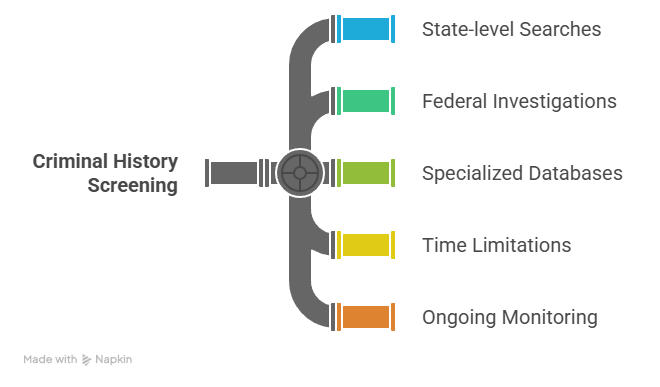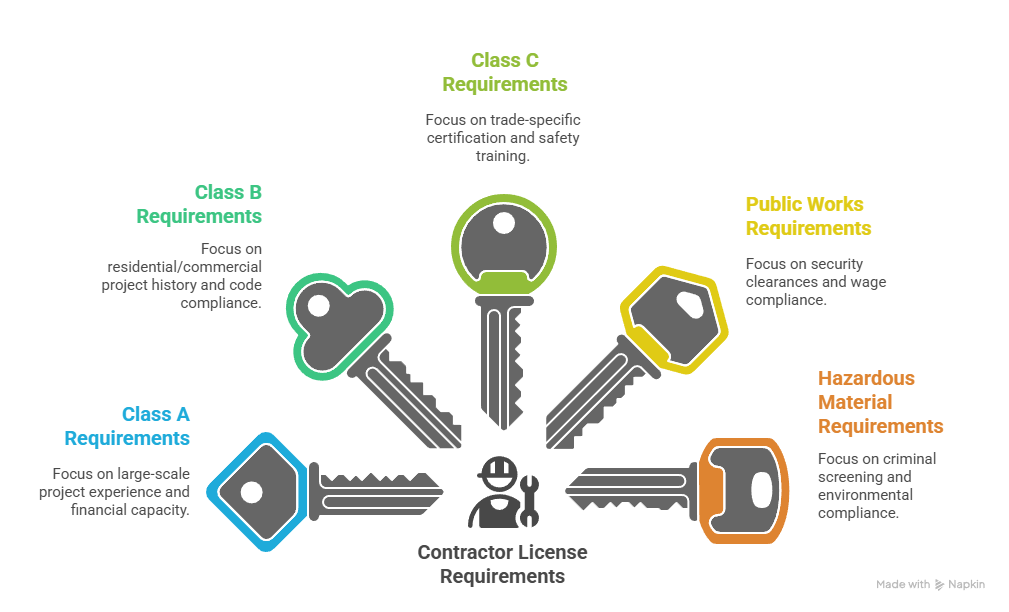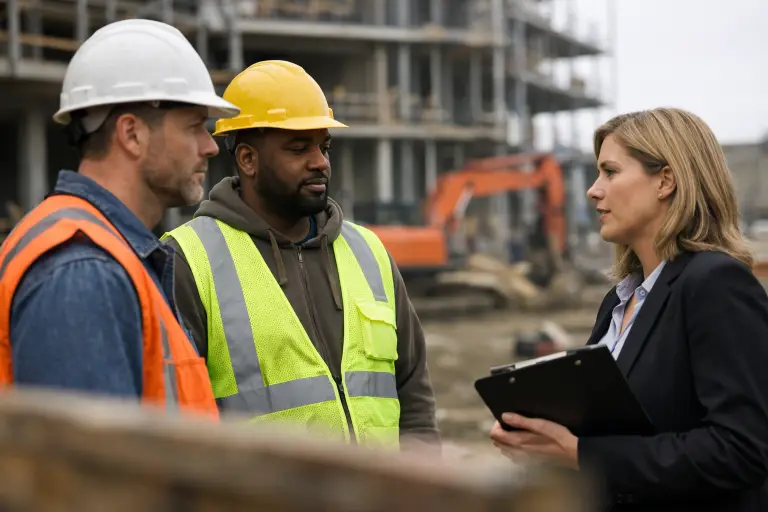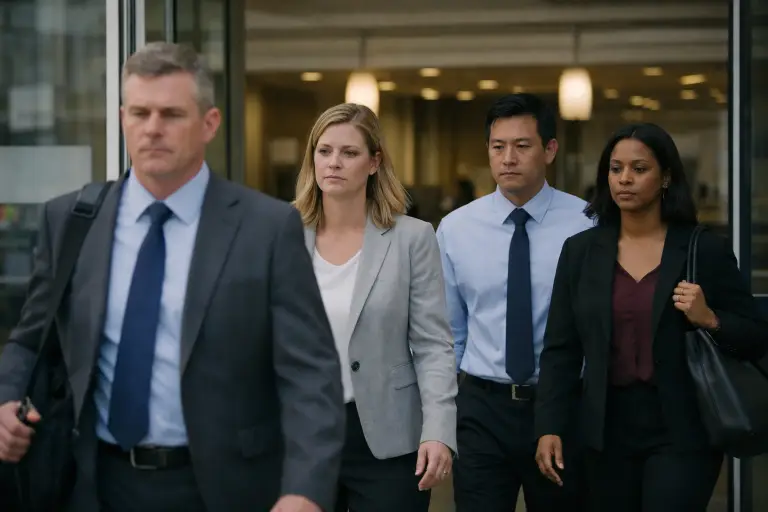California's construction industry mandates comprehensive background checks through the Contractors State License Board (CSLB), with over 285,000 licensed contractors required to undergo fingerprint-based criminal screenings and ongoing compliance monitoring. Recent regulatory changes, including AB 5 worker classification rules and the Fair Chance Act, have fundamentally altered how construction employers must approach background screening processes.
Key Takeaways
- CSLB licensing requires mandatory fingerprint-based criminal background checks through the California Department of Justice, including both state and federal database searches for all contractor applicants.
- Background checks must include criminal history, financial standing verification, and work experience validation, with specific focus on fraud, violence, and public safety-related offenses that could disqualify applicants.
- AB 5 significantly impacts worker classification, requiring more comprehensive employee screening compared to independent contractors while maintaining strict compliance with the ABC test requirements.
- The Fair Chance Act prohibits criminal history inquiries before conditional job offers, necessitating employers to restructure their hiring processes and implement individualized assessment procedures.
- Ongoing compliance obligations include periodic re-screening during license renewals, complaint-triggered reviews, and maintaining detailed records for at least two years per current regulations.
- Technology integration and vendor selection are critical for efficient screening processes, with emphasis on FCRA compliance, HRIS integration capabilities, and transparent reporting systems.
Introduction
California's construction industry faces increasingly complex background check requirements that impact every aspect of hiring and contractor licensing. The convergence of CSLB regulations, AB 5 worker classification rules, and Fair Chance Act provisions creates a challenging compliance landscape that demands careful navigation. With potential penalties ranging from license denial to significant financial liabilities, understanding these requirements is no longer optional—it's essential for business survival. This comprehensive guide provides construction employers and contractors with the knowledge and tools needed to implement compliant, effective background screening programs that protect both their businesses and the public they serve.
Understanding California Construction Background Check Requirements
California's construction industry operates under one of the nation's most stringent regulatory frameworks, where background checks serve as the cornerstone of public safety and professional integrity. The state's approach to contractor screening reflects decades of legislative refinement aimed at protecting consumers while maintaining a skilled workforce.
The Contractors State License Board oversees a complex verification system that goes well beyond simple criminal record checks. This comprehensive approach examines multiple aspects of an applicant's background, from financial stability to professional competence, ensuring only qualified individuals enter the trade.
The CSLB Licensing Framework
The CSLB framework establishes mandatory background check protocols that apply to all contractor license applicants, regardless of classification or specialty. These requirements stem from California Business and Professions Code sections that prioritize consumer protection and industry standards.
| Check Component | Requirement Details |
| Criminal History | FBI and DOJ fingerprint scanning, multi-state database searches |
| Financial Review | Credit reports, bankruptcy filings, bond history verification |
| Professional Verification | 4+ years experience documentation, reference validation |
| Ongoing Monitoring | License renewal checks, complaint-triggered investigations |
The framework's enforcement mechanisms include automatic license suspension for certain convictions and mandatory reporting requirements for contractors facing legal actions.
Current Regulatory Changes Impacting Background Checks
The California construction industry has experienced significant regulatory shifts in recent years, fundamentally altering how employers approach background screening. These changes reflect broader societal movements toward fair hiring practices while maintaining public safety standards. Understanding and adapting to these evolving requirements is crucial for maintaining compliance and avoiding costly penalties that can impact both operations and reputation.
October 2023 Fair Chance Act Updates
The Fair Chance Act amendments now require employers to delay criminal background inquiries until after extending conditional job offers. This fundamental shift affects traditional hiring workflows and necessitates revised application procedures.
- Pre-offer restrictions: No criminal history questions on applications or during interviews
- Individualized assessments: Required evaluation of conviction relevance to specific job duties
- Notice requirements: Mandatory pre-adverse and adverse action notifications with specific timelines
- Record retention: Two-year minimum storage of all background check documentation
These changes require construction employers to restructure their entire screening process, often necessitating legal consultation to ensure full compliance.
AB 5 Worker Classification Impact
Assembly Bill 5's implementation has created distinct background check requirements based on worker classification status. The legislation's ABC test determines whether workers qualify as independent contractors or must be classified as employees.
| Classification | Background Check Requirements | Key Considerations |
| Employees | Full criminal, employment, and reference checks | FCRA compliance, Fair Chance Act applies |
| Independent Contractors | License verification, insurance confirmation | CSLB status validation, business entity checks |
| Specialized Trades | Trade-specific certifications, safety records | OSHA compliance, union verification if applicable |
Misclassification carries severe penalties, making accurate worker categorization essential before determining appropriate screening protocols.
Types of Background Checks Required
Construction background checks encompass multiple verification types, each serving specific risk mitigation purposes within the industry's unique operational context. The scope and depth of required screenings vary significantly based on factors including job responsibilities, project types, and funding sources. Employers must carefully balance thoroughness with legal compliance, ensuring their screening protocols address legitimate business needs without violating privacy rights or anti-discrimination laws.
Criminal History Screening
Criminal background screening forms the foundation of construction industry vetting, utilizing multiple databases and verification methods to ensure comprehensive coverage.

- State-level searches involve querying California DOJ databases across all counties to identify any criminal activity within the state's jurisdiction.
- Federal investigations utilize FBI fingerprint checks that reveal interstate criminal activity and ensure comprehensive national coverage for serious offenses.
- Specialized database searches include sex offender registries, terrorism watchlists, and professional sanctions that might impact workplace safety or compliance.
- The standard seven-year lookback period applies to most criminal convictions, though exceptions exist for serious felonies and positions with higher salary thresholds.
- Continuous monitoring services provide ongoing alerts for high-risk positions, ensuring employers receive timely notifications of new criminal activity.
Construction employers must balance thorough screening with legal compliance, particularly regarding arrest records and sealed convictions.
Financial and Professional Verification
Financial responsibility verification has become increasingly important in construction background checks, particularly for roles involving project management or financial decision-making. Credit reports reveal patterns of financial behavior that might indicate risk factors for positions handling company resources or client funds.
Professional verification extends beyond simple employment confirmation. Contractors must provide detailed documentation of their work history, including project lists, supervisor contacts, and evidence of completed work. The CSLB requires sworn statements attesting to experience claims, with severe penalties for falsification.
Industry-Specific Requirements by License Class
Different contractor license classifications trigger varying background check depths and focus areas, reflecting the unique risks and responsibilities associated with each specialty.

- Class A (General Engineering): Emphasis on large-scale project experience, public safety records, and financial capacity
- Class B (General Building): Focus on residential/commercial project history, code compliance, and subcontractor management
- Class C (Specialty Contractors): Trade-specific certification verification, safety training records, and specialized equipment operation
- Public Works Projects: Additional security clearances, prevailing wage compliance history, and union affiliation verification
- Hazardous Material Handlers: Enhanced criminal screening, substance abuse testing, and environmental compliance records
Each classification requires tailored screening approaches to address specific industry risks and regulatory requirements.
Best Practices for Construction Employers

Successful background check implementation requires more than simply following legal requirements—it demands strategic planning and systematic execution. Construction employers must develop comprehensive policies that balance thorough screening with operational efficiency and candidate experience. The following best practices represent industry-leading approaches that minimize risk while maintaining compliance with California's complex regulatory framework.
Implementing effective background check procedures requires a systematic approach that balances thoroughness with efficiency while maintaining strict legal compliance.
| Best Practice Area | Implementation Strategy |
| Policy Development | Create role-specific screening matrices, document decision criteria |
| Vendor Selection | Choose FCRA-compliant providers with construction industry expertise |
| Process Standardization | Establish consistent timelines, automate workflows where possible |
| Compliance Training | Regular staff education on Fair Chance Act and FCRA requirements |
| Documentation Management | Implement secure storage systems with appropriate retention periods |
Successful implementation requires ongoing evaluation and adjustment as regulations evolve and technology advances.
Legal Compliance Considerations
Navigating the legal landscape of construction background checks requires understanding multiple overlapping regulatory frameworks at federal, state, and local levels. The interplay between FCRA requirements, California-specific privacy laws, and industry regulations creates a complex compliance matrix that demands careful attention. Failure to properly address these legal obligations can result in significant financial penalties, lawsuits, and reputational damage that extends far beyond immediate hiring decisions.
FCRA Compliance Requirements
The Fair Credit Reporting Act establishes fundamental requirements for employment background checks that construction employers must follow without exception.
- Disclosure and authorization: Standalone documents clearly explaining background check purposes and scope
- Adverse action process: Pre-adverse action notices with report copies, waiting periods, and final adverse action notices
- Dispute resolution: Procedures for candidates to challenge inaccurate information
- Vendor certification: Ensuring background check providers maintain FCRA compliance
- Record disposal: Secure destruction of background check reports after retention periods
Non-compliance can result in individual lawsuits, class actions, and regulatory penalties reaching thousands of dollars per violation.
California-Specific Requirements
California's additional privacy protections create unique compliance obligations beyond federal requirements. The California Consumer Credit Reporting Agencies Act (CCRAA) mandates enhanced disclosures and provides broader dispute rights than federal law.
Ban-the-box legislation through the Fair Chance Act fundamentally alters traditional hiring sequences. Employers must restructure their processes to delay criminal history inquiries while still maintaining efficient hiring timelines. This requires careful coordination between HR, hiring managers, and background check vendors.
Technology and Vendor Management
Modern background check processes increasingly rely on technology integration to manage volume, ensure accuracy, and maintain compliance across multiple jurisdictions.
- HRIS integration: Seamless data flow between screening platforms and HR systems
- Automated compliance: Built-in Fair Chance Act workflows and FCRA notice generation
- Real-time monitoring: Continuous screening alerts for existing employees
- Mobile accessibility: Candidate-friendly interfaces for consent and communication
- Audit trails: Comprehensive documentation of all screening activities and decisions
Selecting the right technology partner requires evaluating both current capabilities and future scalability to accommodate regulatory changes.
Common Challenges and Solutions
Construction employers face numerous obstacles when implementing compliant background check programs, from keeping pace with regulatory changes to managing costs effectively. These challenges are compounded by the industry's unique characteristics, including high turnover rates, varied worker classifications, and multi-jurisdictional operations. Understanding these common pain points and their solutions helps organizations proactively address issues before they become costly problems.
Regulatory Complexity Management
The intersection of federal, state, and local regulations creates a complex compliance landscape that challenges even experienced HR professionals.
| Challenge | Solution Approach | Resources Needed |
| Multi-jurisdictional compliance | Centralized policy management, regular legal updates | Legal counsel, compliance software |
| Changing regulations | Quarterly policy reviews, industry association participation | Training budget, staff time |
| Documentation requirements | Automated retention systems, clear disposal protocols | Document management platform |
Proactive management strategies prevent compliance failures that could result in significant financial and reputational damage.
Cost Optimization Strategies
Managing background check expenses requires strategic planning to balance thoroughness with budget constraints. Construction companies often face pressure to minimize costs while maintaining comprehensive screening standards.
- Negotiate volume-based pricing agreements with screening vendors to reduce per-check costs as hiring scales up.
- Implement tiered screening protocols that match check depth to position risk levels, avoiding unnecessary expenses for low-risk roles.
- Leverage technology integration to automate manual processes and reduce administrative time spent on screening coordination.
- Consolidate screening vendors to streamline invoicing and potentially qualify for better pricing through increased volume.
- Invest in quality initial screenings to prevent costly bad hires that result in turnover, training losses, and potential liability.
The true cost of inadequate screening far exceeds the investment in comprehensive background checks. By viewing screening as risk mitigation rather than mere expense, construction employers can justify appropriate budget allocations that protect their long-term interests.
Future Trends in Construction Background Checks
Emerging technologies and evolving regulations continue to reshape the construction industry's approach to background screening.
- Artificial Intelligence integration: Machine learning algorithms improving accuracy and reducing bias in screening decisions
- Blockchain verification: Immutable records for credential and experience verification
- Continuous monitoring expansion: Real-time alerts for criminal activity or license status changes
- Predictive analytics: Data-driven insights identifying potential safety or performance risks
- Mobile-first processes: Complete screening workflows accessible via smartphone applications
Staying ahead of these trends positions construction companies to maintain competitive advantages while ensuring compliance with emerging regulations.
Conclusion
California's construction background check requirements represent a complex but navigable system designed to protect public safety while supporting a skilled workforce. Success requires understanding the interplay between CSLB licensing requirements, AB 5 worker classifications, and Fair Chance Act obligations. By implementing comprehensive screening policies, selecting appropriate technology partners, and maintaining ongoing compliance vigilance, construction employers can build teams that meet both regulatory standards and business objectives. The investment in proper background screening processes pays dividends through reduced liability, improved workplace safety, and enhanced reputation in California's competitive construction market.
Frequently Asked Questions
How long does a California construction background check typically take?
CSLB licensing checks typically require 2-4 weeks for completion due to fingerprinting and multi-agency verification requirements. Private employment background checks for construction workers generally complete within 3-7 business days, though complex histories or out-of-state records may extend timelines.
What criminal convictions disqualify someone from obtaining a California contractor's license?
Substantially related convictions including fraud, theft, violence, or crimes involving moral turpitude within the past seven years often result in denial. However, the CSLB considers rehabilitation evidence, time elapsed since conviction, and the nature of contracting work involved before making final determinations.
Does AB 5 require background checks for independent contractors in construction?
AB 5 doesn't mandate background checks for properly classified independent contractors, but businesses often require them for liability protection. Independent contractors must maintain valid CSLB licenses, which involve their own background check requirements through the state licensing process.
Can California employers check credit reports for construction workers?
Credit checks are permitted only for positions involving financial responsibilities, access to $10,000+ in assets, or managerial roles. Employers must provide specific notices and obtain written authorization, with limitations under California Civil Code Section 1785.20.1.
How far back can criminal background checks go in California construction?
California generally limits criminal history consideration to seven years for most positions. Exceptions exist for positions earning $125,000+ annually and certain serious felonies. Arrest records without convictions cannot be considered regardless of timeframe.
What should I do if my background check contains errors?
Immediately dispute inaccuracies with the background check company in writing. They must investigate within 30 days and correct or remove unverifiable information. You're entitled to a free corrected report and can add a personal statement explaining disputed items.
Additional Resources
- California Contractors State License Board Official Fingerprinting Requirements
https://www.cslb.ca.gov/about_Us/faqs/fingerprint_q_and_a.aspx - CSLB Journeymen Fingerprinting Requirement Documentation
https://www.cslb.ca.gov/Resources/Contractors/Journeymen/FingerprintingRequirement.pdf - Procore Guide to California Contractor Licensing
https://www.procore.com/library/california-contractors-license - Criminal Conviction Information for Contractor Licensing
https://www.contractorslicenseguru.com/criminal-conviction-information/ - California Department of Fair Employment and Housing - Fair Chance Act
https://www.dfeh.ca.gov/fair-chance-act/ - Federal Trade Commission - Background Checks: What Employers Need to Know https://www.ftc.gov/tips-advice/business-center/guidance/background-checks-what-employers-need-know

GCheck Editorial Team
Meet the GCheck Editorial Team, your trusted source for insightful and up-to-date information in the world of employment background checks. Committed to delivering the latest trends, best practices, and industry insights, our team is dedicated to keeping you informed.
With a passion for ensuring accuracy, compliance, and efficiency in background screening, we are your go-to experts in the field. Stay tuned for our comprehensive articles, guides, and analysis, designed to empower businesses and individuals with the knowledge they need to make informed decisions.
At GCheck, we're here to guide you through the complexities of background checks, every step of the way.





